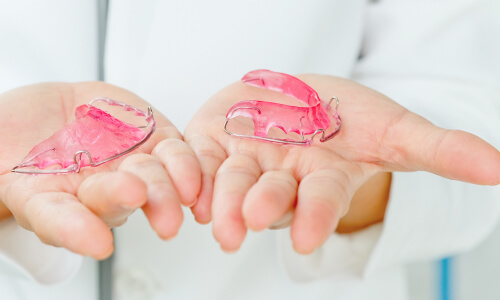What Are Retainers?
A retainer is a removable prosthetic device that you wear after your braces have been removed. It’s a small appliance made from metal wires and acrylic or plastic that helps you maintain the new position of your smile.
Retainers can also be used for minor orthodontic issues that don’t require braces, and to treat temporomandibular joint disorder (TMD).

Cleaning Your Retainer
You’ll need to keep your retainer moisturized at all times. When you’re not wearing it, soak your retainer in distilled water and brush it using a non-porous cleaning solution. Make sure the solution you choose is FDA-approved and able to clean between the small gaps in your retainer.
Meet With Dr. Grussmark to Learn More
If you’ve recently had your braces removed, or if you have a minor issue that doesn’t require braces, a retainer could be the ideal solution for you. To learn more about retainers, contact one of our three locations in the Miami area and schedule your free consultation with Dr. Grussmark.
Frequently Asked Questions
It’s best to store your retainer in its carrying case to keep it safe, but soaking your retainer in water can help keep it clean. We recommend soaking your retainer once a week to keep it free of bacteria.
Make sure your carrying case and retainer are clean and dry to prevent the growth of bacteria. Storing your retainer while it’s still wet can lead to bacteria and put your oral health at risk.
You should clean your retainers multiple times a day to make sure they’re clear of food. You can do this by rinsing them off with lukewarm water and also brushing your teeth after you eat. Keeping your teeth clean helps to keep your retainers clean by preventing bacteria from transferring onto the retainer.
To clean your retainers, use mild dish soap and a soft-bristled toothbrush to brush the retainers. Toothpaste can be abrasive and scratch the retainers. You may also want to use a cotton swab to clean out any small areas the brush can’t reach.
Yes, not cleaning your retainer can have serious health consequences. Bacteria can build up on your retainer and make you more vulnerable to cavities as well as infections. These conditions can spread to your body and put you more at risk.
Oral bacteria can spread through your bloodstream to other parts of your body and lead to more serious health conditions. These include cardiovascular disease, stroke, and pneumonia.

